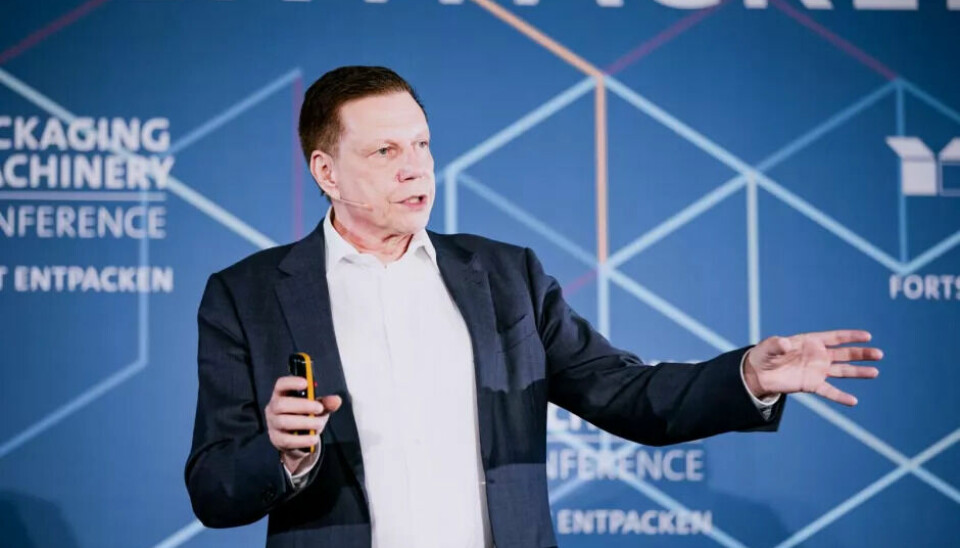Ralf Schubert on the use of artificial intelligence in packaging machinery
“AI will change everything”

Ralf Schubert demonstrated at the Packaging Machinery Conference 2025, using his company as an example, how artificial intelligence can be specifically applied in packaging machinery - for instance, in robotics, motion planning, and document search. A practical insight into the possibilities of a technology that is changing the world at an unprecedented speed.
Ralf Schubert, managing partner of the packaging machine manufacturer Gerhard Schubert, opened his lecture with a tongue-in-cheek disclaimer: "I am extremely pleased to be able to talk about AI here today. However, I am not an AI expert - but I still write two to three programs every year, partly for the company, partly privately. Simply out of interest." What followed was nevertheless a profound and detailed insight into the practice, philosophy, and strategy surrounding the use of AI in mechanical engineering - especially at Schubert itself.
And early in his presentation, Schubert made it unmistakably clear: "AI will change everything." The technology, as he explained figuratively, is "out of the lamp" - like an all-powerful genie that can no longer be put back.
What is new is not only the technology but also the speed of its triumph: "The industrial revolution took 100 years, the internet took 20 years - and with AI, it will happen significantly faster again."
Apparently, such a verbal thunderbolt is needed - according to a survey from 2023, at that time only 12% of German companies were using AI, with a few more percent in mechanical engineering.
From theory to practice: What is AI?
The lecture began with a fundamental introduction to the nature of artificial intelligence. Schubert clarified the difference between classical programming and AI-based approaches: While programming generates an output from an algorithm and input, AI relies on data and results from which rules are derived to process new inputs in the future.
His depiction of neural networks was particularly vivid, explaining them from the biological neuron through the perceptron to today's deep learning. He spanned the historical arc from Turing and the famous Turing test named after him, through the computer program Eliza, Deep Blue, to Alpha Go and GPT-4. He described the latter as "a stochastic parrot with remarkable abilities, but also dangerous hallucinations."
Concrete application examples at Schubert
The focus of the lecture, however, was on practical applications at Schubert: For example, in the Cobot system Tog.519, neural networks are used to recognize and grasp products using ordinary cameras instead of expensive light field systems. "This saved us around 10,000 euros per system," explained Schubert. In the training process, 30,000 synthetically generated images are used to train the networks on the position and orientation of products.
Another area is the motion planning of robots. In Dresden, the "Schubert Motion" team is developing AI-based path planning, which according to Ralf Schubert has achieved a 20% performance increase, less mechanical stress, and lower energy consumption - all without classical programming.
Schubert also described the detection of overloads or vacuum failures in pick-and-place robots. These tasks are often too slow or unreliable for classical sensors - cables would simply fail at 120 cycles per minute. However, AI can precisely detect deviations in the airflow to determine if, for example, a product has been lost.
And last but not least, Schubert introduced the company's proprietary AI-supported system Schuugle. This allows employees to access documents, images, tickets, or parts lists - without manual searching. A Chat-GPT-like interface facilitates semantic information retrieval.
Tension between humans and machines
In the subsequent discussion round, Schubert spoke openly about his skepticism towards fully data-driven process optimization: "If a machine really wants to monitor everything, I need 1,000 sensors. This then creates a complexity prone to errors - and is simply too expensive." Instead, he emphasized the role of humans, which is "still required."
Despite his enthusiasm for AI, Schubert remains a pragmatist: "AI is a tool, not a replacement," he emphasized, making it clear that curious and willing-to-learn employees are needed to harness its potential. As an example, he mentioned a service employee who used Chat GPT to write Excel macros without resorting to the IT department.
A look into the future: Between humility and vision
When asked how the world will change in one to two years, Schubert responded cautiously: "A lot will definitely happen - but it's hard to predict what." However, it is clear to him that the pace of progress is high, but it must not be uncontrolled; the introduction of a dedicated AI strategy is essential for companies. And to be effective, it must not be delegated but must come from the top management level - similar to the topic of sustainability. Likewise, dealing with regulatory frameworks such as the AI Act is important, which Schubert criticized as "typically European": "We always think about the risks first before we see the opportunities."
Conclusion: AI has arrived - even in medium-sized businesses
Ralf Schubert's lecture was an exciting insight into how a medium-sized company not only uses AI but also drives it forward out of an inner conviction. And it showed that you don't have to be a research institution or a digital corporation to integrate AI into packaging machine construction. Imitators welcome!